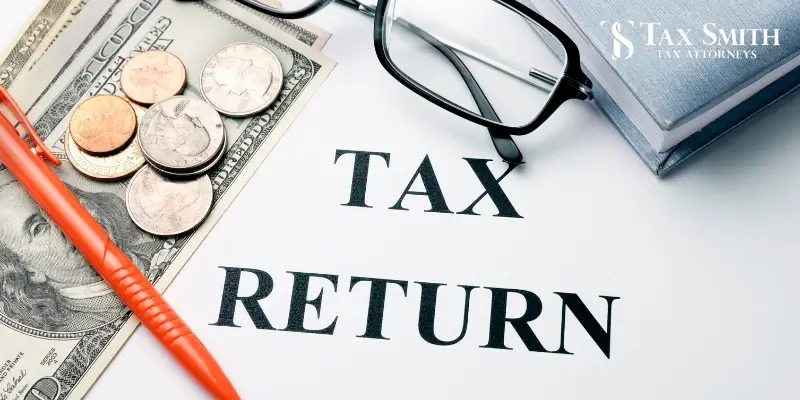1548 The Greens Way – Ste. 4 Jacksonville Beach FL 32250
Jacksonville Unfiled Tax Returns Attorney
Jacksonville Unfiled Tax Returns Lawyer
When you owe back taxes and have tax debt, life can be stressful. There are many reasons why someone may have failed to file one or multiple years of tax returns. The most important step in dealing with tax debt is to handle any unfiled tax returns. When you fail to file your tax returns, penalties and interest begin to build up. Left alone, this financial problem will only get worse.
If you are unsure how to handle growing tax debt, talk with a compassionate Jacksonville IRS tactics attorney who can guide you through the best legal solutions. At TaxSmith, LLC, we help clients resolve unfiled tax returns and minimize penalties, so they can regain control of their finances. When you discuss tax debt with an experienced tax attorney, you can be better informed about your options for paying back your unfiled tax returns in Jacksonville, FL.

Tax Smith Tax Attorneys: Help With Your Unfiled Tax Returns
If you feel you had reasonable cause for failing to file your tax returns, or simply need assistance limiting your tax debt, you need a qualified tax debt lawyer. At Tax Smith Tax Attorneys, we have decades of combined experience with many types of tax cases. We can provide you with an outline of the options available to you for settling your debt.
When you need help filing your unfiled tax returns, our experts can help. We have worked with many clients on their tax returns and can help you do things the right way. We believe in personalized legal counsel to be sure our advice fits the needs of your situation.
Failing to File Tax Returns
Taxpayers in the U.S. may fail to file their taxes for a number of reasons. An emergency may have come up at the wrong time, or they procrastinated too long. Some taxpayers do not have the money to pay their owed taxes, fail to work with the IRS on a payment plan, and instead try to ignore the issue.
When you fail to pay your taxes on time, the IRS will register a failure-to-file penalty against you. Each month that you fail to file, these charges will grow. The interest and penalties accrued from failing to file can usually be resolved by voluntarily working with legal advisors to address the issue, get out of tax debt, and file your taxes. If someone has failed to file their taxes willingly, and refuses opportunities to resolve the problem, the IRS may file criminal charges against them. However, there are many consequences that non-filers will see prior to charges being pressed.
Why Do I Need an Unfiled Tax Returns Lawyer?
Although it is possible to file past-due tax returns yourself, it can be overwhelming. The process can be made simpler with an attorney or other tax expert, and legal counsel can also provide you with other options for limiting or erasing your tax debt. Depending on your circumstances, you could qualify for penalty abatement, an offer in compromise, or payment through installment agreements. An attorney can help you file correctly, gather the necessary information, and avoid common pitfalls in tax filing that could cost you money.
A tax attorney can also handle more complex and frustrating filing tasks. They are also more experienced in negotiating tax settlements and other discussions with the IRS. Working with an attorney can lessen your stress. It can also boost your confidence in the accuracy and completeness of your tax returns.
Consequences of Failing to File
Depending on how long you have gone without filing your tax returns, penalties and consequences can build up to severe levels. The problems will extend beyond your finances and will affect much of your life. Consequences for unfiled taxes include:
- Tax Penalties
For every month you are late filing your tax return, you will likely see a failure-to-file. This late fee is generally a percentage of your total tax debt and is capped at 25%. This is not the only fee that may be filed against you, however. Other penalties include, among other fees:- Failure to pay
- Underpayment of tax
- Failure to deposit
- Dishonored check penalties
These costs build up over time. Your tax debt will also gain interest over time. This can become a serious problem very quickly, so talk with an expert on how you can resolve these penalties.
- Tax Liens
A federal tax lien claims your assets as the government’s legal assets and informs creditors that the government has a legal right to your property. Assets include financial assets, personal property, and real estate. This protects the government’s interests and is created if the IRS assesses your liability, sends you a Notice and Demand for Payment, and you fail to pay your tax debt.A tax lien claims all your assets and may limit your ability to receive credit. It could also impact your ability to get a job. Tax liens also continue to impact you if you file for bankruptcy. - Bank Levies
A bank levy can apply to any individual, business, or institutional bank account under your name. It can prevent you from accessing the funds in your account by freezing it. A bank levy requires the bank to hold your funds up to the amount you owe the IRS. They must hold your funds for up to 21 days. During this time, you should contact an attorney. They can discuss releasing your funds with the IRS. - Wage Garnishment
Wage garnishment is when the IRS informs your employer of an unpaid tax debt. They then require your employer to deduct a portion of your wages to send to the IRS to recover some amount of that debt. Wage garnishments can affect self-employed taxpayers’ businesses’ accounts receivable. They can also affect social security or military retirement benefits. They continue to impact your wages until your tax debt is paid or you negotiate another solution with the IRS. Wage garnishment may happen simultaneously with a bank levy. This can cause immense financial issues for taxpayers. - Revenue Officers
Revenue officers are collection officers. If one has been assigned to your tax debt case, you are at the highest level of unfiled tax returns and tax debt. The goal of a revenue officer is to get your tax debt paid in full as soon as possible. If you have been assigned a revenue officer, you need to contact a professional tax attorney. That way, we can prevent you from providing information that may be used against you. The revenue officer must deal with your attorney instead of you. - Criminal Charges
If you have failed to file tax returns for many years, have done so willingly, and have refused chances to resolve your tax debt, the IRS can press criminal charges against you. Willing tax evasion can lead to arrest and jail time.
Voluntary Disclosure for Unfiled Taxes
The IRS has policies for voluntary disclosure. This means that a taxpayer can correct mistakes or file unfiled tax returns. This must be done in a timely manner, before the taxpayer has received notice from the IRS or the IRS has begun an examination or investigation. This can help taxpayers avoid prosecution, sometimes even for fraudulent returns. Voluntary disclosure must be done with accurately filed returns, or the likelihood of criminal charges increases. This program must be entered into with good faith, and in some cases, it may involve an IRS tax audit to verify the accuracy of past filings. A tax attorney can help you determine if this is the right path for you and ensure the filing is accurate.

FAQs About Jacksonville, FL Tax Law
Who helps with unfiled taxes in Jacksonville, FL?
You can receive assistance with unfiled taxes from tax attorneys and other tax professionals. They can help you determine what options for settlement are available to you. They can also help you ensure your tax returns are filed with accurate and detailed information. Personalized legal counsel will help you decide if an offer of compromise, a penalty abatement, or another avenue of settlement is best for your situation.
How do I resolve unfiled tax returns?
Talk with a tax professional regarding unfiled returns. They can work with you to gather information and accurately complete your unfiled tax returns. Even if you are unable to pay your tax debt, you should discuss your options. There are avenues for settling or lowering your tax debt. Waiting to file will only increase the penalties, fees, and other consequences from the IRS.
Is there a statute of limitations on unfiled tax returns?
No, there is no statute of limitations on unfiled tax returns. Interest and penalties can be added to any of your unfiled tax returns. If you are filing for unfiled taxes, the IRS generally only requires you to file the last six years’ worth of unfiled tax returns. The IRS may require you to file unfiled tax returns from the prior six years if they:
- Suspect illegal activity.
- Believe that your tax liability was significant.
- Need past information for a current tax return.
Do people get away with not filing taxes?
There are reportedly 10 million people with unfiled taxes. However, the IRS has become more aggressive in the last few years in pursuing those who have been non-filers for years. This includes filing substitute tax forms with third-party information and pursuing individuals. There are numerous financial ramifications for failing to file your taxes. You may even face criminal charges.
How Tax Smith Tax Attorneys Can Help You
At Tax Smith Tax Attorneys, we have decades of experience handling unfiled tax returns and communicating with the IRS. We know this industry and IRS tactics well. Our firm can defend you from IRS tactics. We can also provide you with reliable information and filing assistance, as well as help you reduce your tax debt. Contact our firm today.
Locations We Serve
- Alabama
- Arizona
- California
- Colorado
- Connecticut
- Delaware
- District of Columbia
- Florida – HQ
- Georgia
- Idaho
- Illinois
- Indiana
REQUEST A CONSULTATION
Please fill out the Contact Request Form and a Tax Attorney/Paralegal will call you
to discuss legal representation or to schedule your free initial consultation





